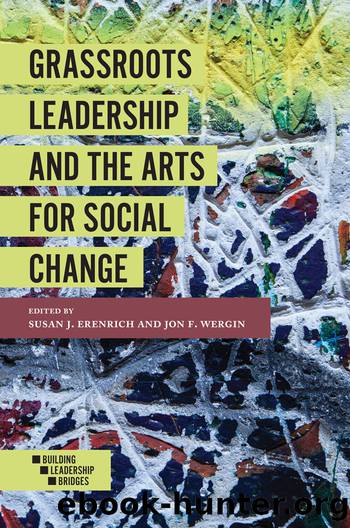Grassroots Leadership and the Arts for Social Change by Erenrich Susan J.;Wergin Jon F.;

Author:Erenrich, Susan J.;Wergin, Jon F.;
Language: eng
Format: epub
Publisher: Emerald Publishing Limited
Published: 2017-03-18T00:00:00+00:00
Joe Hill, the IWW and the Power of Singing Together
So just who was Joe Hill and why were we commemorating him in our concert tours in 2015? Joe Hill was born Joel Emmanuel Hägglund in 1879 in Gävle, Sweden. He was the third child in a family of nine. There was music in the Hägglund home and Joel played the organ, accordion, violin, piano, and also later learned the guitar (Smith, 1969, p. 44). In about 1902, after his father died, Joel and his brother immigrated to the United States. He changed his name to Joe Hillstrom, and ultimately shortened it to âHill.â Joe became an itinerant worker, traveling and working various jobs from New York to Cleveland, and various other places, ultimately arriving on the west coast, where he joined the IWW in 1910 while working the docks in San Pedro, California (Rosemont, 2002, pp. 45, 46). He became well known among his âFellow Workersâ as an organizer and as a cartoonist for IWW publications, but more importantly as a writer of parodies for the unionâs songbook. His best-known and most widely sung songs were parodies of popular tunes and hymns of the time, Casey Jones, the Union Scab, There Is Power in a Union, and The Preacher and the Slave, otherwise known as Pie in the Sky, a well-known phrase he coined which forms part of the last line of the refrain in the song. Joeâs songs became the best-loved ones among Wobblies all across the country and his name was known far and wide. Hill was working and living in a Swedish immigrant community in Salt Lake City, Utah, in January of 1914 when an armed robbery occurred there. Two masked men gunned down John Morrison, a former policeman, along with his son in the grocery store they owned and operated. That same night Joe Hill had an argument with a friend over a woman for whose affections they both were vying. Joeâs friend pulled a gun and fired, and Joe suffered a gunshot wound in the abdomen, similar to one suffered by one of the armed robbers in the grocery store. After Hill sought medical attention, the doctor who tended to the wound notified the police, thinking Joe might be one of the robbers. Hill was arrested and charged with robbery and murder. The prosecution was swift and unrelenting, painting the famous Wobbly bard as a rabble-rousing miscreant, a subversive member of the IWW. There was little doubt that Joeâs active membership and high profile as a songwriter in the IWW was a major factor in the prosecution of the case (Kornbluh, 1964, p. 128). The police described the shooting of Morrison as a ârevenge killing,â yet Joe Hill had never met him and had no connection to him at all (Adler, 2011, p. 53). Hill refused to name his friend as his assailant, and also refused to name the woman over whom they were arguing. He naively assumed the court was required to prove him guilty, and that it was not his own duty to prove his innocence.
Download
This site does not store any files on its server. We only index and link to content provided by other sites. Please contact the content providers to delete copyright contents if any and email us, we'll remove relevant links or contents immediately.
Hit Refresh by Satya Nadella(8344)
The Compound Effect by Darren Hardy(7574)
Change Your Questions, Change Your Life by Marilee Adams(6654)
Nudge - Improving Decisions about Health, Wealth, and Happiness by Thaler Sunstein(6642)
The Black Swan by Nassim Nicholas Taleb(6203)
Daring Greatly by Brene Brown(5651)
Deep Work by Cal Newport(5496)
Principles: Life and Work by Ray Dalio(5334)
Rich Dad Poor Dad by Robert T. Kiyosaki(5162)
The Myth of the Strong Leader by Archie Brown(4795)
Man-made Catastrophes and Risk Information Concealment by Dmitry Chernov & Didier Sornette(4748)
Big Magic: Creative Living Beyond Fear by Elizabeth Gilbert(4734)
The Slight Edge by Jeff Olson(4727)
Discipline Equals Freedom by Jocko Willink(4642)
Digital Minimalism by Cal Newport;(4567)
The Motivation Myth by Jeff Haden(4535)
Stone's Rules by Roger Stone(4422)
Management Strategies for the Cloud Revolution: How Cloud Computing Is Transforming Business and Why You Can't Afford to Be Left Behind by Charles Babcock(4135)
The Doodle Revolution by Sunni Brown(4050)
